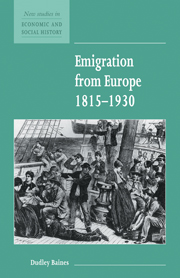Book contents
- Frontmatter
- Contents
- 1 Problems in the history of European emigration, 1815–1930
- 2 Sources of historical information
- 3 Emigration and economic change in Europe
- 4 Emigration regions
- 5 Return migration
- 6 Did emigration change in character?
- 7 Assisted emigration
- 8 Emigration and urban growth
- 9 The economic effects of immigration
- 10 The family and assimilation
- 11 The end of mass emigration
- Conclusion
- Select Bibliography
- Index
- New Studies in Economic and Social History
- Studies in Economic History
- Economic History Society
10 - The family and assimilation
Published online by Cambridge University Press: 05 June 2012
- Frontmatter
- Contents
- 1 Problems in the history of European emigration, 1815–1930
- 2 Sources of historical information
- 3 Emigration and economic change in Europe
- 4 Emigration regions
- 5 Return migration
- 6 Did emigration change in character?
- 7 Assisted emigration
- 8 Emigration and urban growth
- 9 The economic effects of immigration
- 10 The family and assimilation
- 11 The end of mass emigration
- Conclusion
- Select Bibliography
- Index
- New Studies in Economic and Social History
- Studies in Economic History
- Economic History Society
Summary
Recent years have seen a great increase in interest in the experience of the immigrants after they had arrived. Studies have refined our understanding of concepts such as ‘ethnic ghetto’ and ‘assimilation’ and have corrected some serious misconceptions about the immigrant experience in several countries. Many of the misconceptions related to the role of the family.
Historians of American migration frequently used to assume that the immigrants came from a Europe that was not only uniformly poor but had ‘traditional’ institutions that inhibited economic and social change. It followed that a move to the United States would be virtually the only way that a poor European could improve his or her economic condition. Because Europe was characterised as ‘traditional’, emigration was thought to have entailed a move away from the influence of the family. This was partly because immigration was seen as a component of the development of American capitalism which, in turn, was associated with the growth of individual as opposed to collective behaviour. Put another way, emigration was seen as a way in which enterprising individuals could escape the confines of the family or the village community. The immigrant family was ‘uprooted’ by the work patterns of capitalist America (Handlin, 1951).
The immigrant community in the new country was seen as a stepping stone from a ‘traditional past’ to a ‘capitalist future’ (Bodnar, 1985, 142).
- Type
- Chapter
- Information
- Emigration from Europe 1815–1930 , pp. 62 - 66Publisher: Cambridge University PressPrint publication year: 1995



